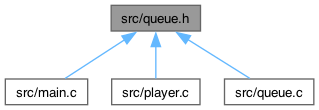Loading...
Searching...
No Matches
queue.h File Reference
Playback queue interface. More...
This graph shows which files directly or indirectly include this file:

Go to the source code of this file.
Data Structures | |
| struct | qentry_s |
| Queue entry structure that holds playback configuration data. More... | |
Functions | |
| int | Q_init (struct q_s **q) |
| Allocates and initializes a new queue instance. | |
| int | Q_append (struct q_s *q, struct qentry_s ent) |
| Appends a new entry to the end of the queue. | |
| int | Q_next (struct q_s *q, struct qentry_s *ent) |
| Gets the next entry from the queue and removes it from the queue. | |
| void | Q_free (struct q_s *q) |
| Frees the memory allocated for the queue instance and all of its remaining entries. | |
Detailed Description
Playback queue interface.
Function Documentation
◆ Q_append()
Appends a new entry to the end of the queue.
- Parameters
-
q queue instance to add the entry to ent entry to add to the queue, string pointers are copied but not the strings themselves, the caller is responsible for managing the memory of the strings to ensure they are valid for the lifetime of the queue
- Returns
- 0 on success, a negative error code on failure
Here is the caller graph for this function:

◆ Q_free()
| void Q_free | ( | struct q_s * | q | ) |
Frees the memory allocated for the queue instance and all of its remaining entries.
Here is the caller graph for this function:

◆ Q_init()
| int Q_init | ( | struct q_s ** | q | ) |
Allocates and initializes a new queue instance.
- Parameters
-
q return pointer to the new queue instance
- Returns
- 0 on success, a negative error code on failure
Here is the caller graph for this function:

